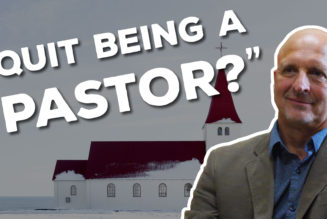By Dr. Jeff Mirus ( bio – articles – email ) | May 29, 2020
During this period of not being able to attend Mass—a period which is now ending ever so slowly in most of the United States—I’ve reflected frequently on this question: What discernible impact is the absence of public Masses having on me? I presume each moderately serious Catholic has reflected on the same personal question.
Here are ten possible answers:
- I have a vague feeling that I’m missing something.
- I find it harder to control unruly impulses.
- I am experiencing more spiritual dryness.
- I feel a deep yearning for Mass and Communion.
- I experience increased feelings of fatigue.
- I have a felt need to increase other forms of prayer.
- I am suffering a sense of isolation from the Church.
- I have lost my normal feelings of spiritual consolation.
- I have only an intellectual awareness of the loss.
- I do not perceive any loss at all.
The reader can probably think of other possible answers, and anybody might feel both surprised and disconcerted by his or her own answer. Yet there is no possible answer that can be said to be wrong.
Piety and feelings
The word “piety” is generally defined as something like “the quality of being religious or reverent”. As a virtue, piety is the habitual fulfillment of the honor, reverence and particular obligations we owe to God as His creatures. But in no case does “piety” demand that we feel particular “sentiments”, though in common speech we may refer to those who appear to be motivated by such sentiments as “very pious”. No, the value of piety as either a human virtue or a gift of the Holy Spirit does not consist in “spiritual feelings” but in our consistent willingness to give what is due to God.
Every aspect of our unique personalities—the special combination of shared and individual qualities and graces which makes each of us not only human but uniquely human—has a bearing on how we experience piety, including whether we find pious actions to be humanly satisfying or not. All of these special personal qualities—our “psychology”, to use a word that is far too secular—combine with engraced gifts of consolation (or their lack) to determine whether and in what ways we “enjoy” being pious. All of these special personal qualities and particular graces also determine whether (and how) we feel the lack of even the immensely powerful sacraments of the Church.
Our feelings may be strongly connected with sacramental reception or they may be in many ways indifferent to it. In the last analysis, it is the higher faculties of the soul which we must use in assessing our response to the current deprivations. In other words, our intellects tell us we are missing something based on our understanding of the content of our faith, whether we feel it or not. This leads us to assess any feelings we may have in the light of Faith, and to discern (with or without the assistance of particular feelings, or even in spite of them) what steps we should take to compensate, insofar as possible, for what we are missing. Clearly this should at least lead each well-instructed Catholic to cultivate especially good habits of prayer during a period of sacramental deprivation, and to look also for particular ways to keep the importance of the sacraments in mind and heart.
In this sense, some feelings will be helpful, others will be neutral, and still others will be spiritual obstacles. For example, I can enjoy a later wake-up schedule when daily Mass is not available, and I have always physically and emotionally preferred that schedule. So, in this sense, I must guard against the “feeling” or “desire” that this “sacramental inconvenience” should remain in abeyance!
Doing the right thing
I will not list a whole variety of steps that can be taken to avoid falling into a hole we might not wish to climb out of; that will vary for each one of us. I will mention that it has been a great value to me to be close to a small independent Catholic school with its own chapel, which has been kept open for private prayer before the Blessed Sacrament by members of the school community, without any danger of overcrowding. In my case, were that immense good unavailable, I would have had to increase the time I spent in private prayer gradually during this period, in the hope of not losing what I might call my “spiritual edge”.
But the point in this discussion is that each of us is different, and each of us responds differently—emotionally, psychologically, and spiritually—to the deprivations we have experienced. It is important to recognize two critical truths about such deprivations. The first is that, through the very mystery of being joined to Christ through the Church, God supplies our spiritual needs if we seek His help even when we cannot nourish ourselves through the Church’s vital sacramental system. We need have no doubt about that. And the second is that our feelings do not matter in and of themselves; it is how we respond to those feelings that counts.
What is important is to assess these feelings—these affective responses to our current situation—to see how they may be working either to draw us closer to God or to cause us to drift away. When we assess them prayerfully in the light of faith, we then begin to see what we must will ourselves to do. One person might need to avoid succumbing to anger or bitterness because of the unavailability of the sacraments, thereby being pulled away from God in the very act of decrying spiritual deprivation. Another might need to overcome a growing indifference to the whole situation, cooling into that lukewarmness which Christ Himself condemned (Rev 3:16). Still another might need to develop special prayers and disciplines to combat particular temptations or sins. And so on.
But there is no right answer as to how we feel. Feelings are never good or evil in themselves; they become so only through our unfaithful resistance or indulgence. It is their assessment in the light of faith, along with the corresponding exercise of our will conformed to God, that turns feelings to good account, no matter what they are. As we begin to merge back into an ordinary Catholic life that should never again be considered ordinary, we must all be guided not by our feelings, no matter what they may be, but by our Faith.
Sound Off! CatholicCulture.org supporters weigh in.
All comments are moderated. To lighten our editing burden, only current donors are allowed to Sound Off. If you are a donor, log in to see the comment form; otherwise please support our work, and Sound Off!

There are no comments yet for this item.








![My Gay Father-in-Law [Must-Read]…](https://salvationprosperity.net/wp-content/uploads/2024/01/my-gay-father-in-law-must-read-327x219.jpg)